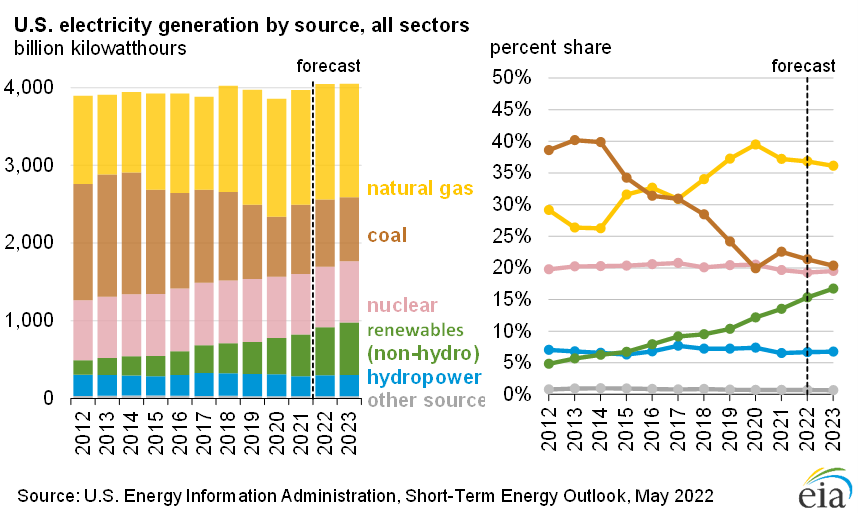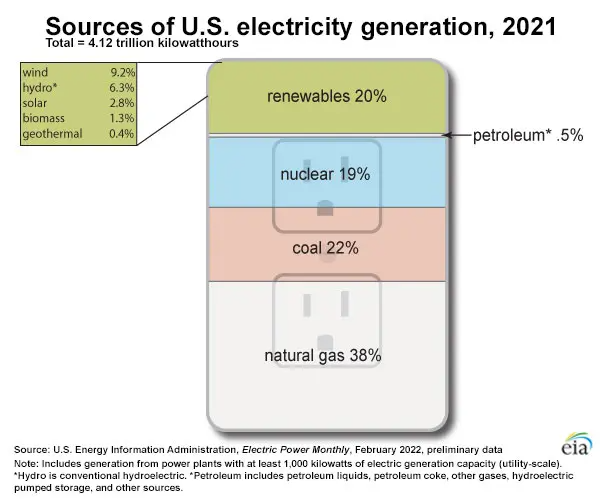
Electric Vehicles are becoming more and more popular mainly because people feel they are saving the environment. But is this true? One aspect of the growing trend toward electric vehicles (EVs) that seems to get lost in the rhetoric is where the energy is coming from to support the charging of the vehicles. The U.S. Grid has had stagnant growth over the last 10-15 years1. Stagnant growth means that the grid has been able to keep up with the rising demand. This may not be the case if the trend toward EVs continues. Most of the electric growth in the last 20 years has come from renewable sources.

The energy sector is not planning to construct new nuclear plants or coal plants.
Unfortunately, renewable sources are the most “unreliable” sources of power for the U.S. grid. What does unreliable mean in this context? It means that solar power only works when the sun is out. And wind only works when the wind is blowing. The majority of the power in the U.S. still, and must continue to come from coal and natural gas. When the sun is not shining and the wind is not blowing, coal plants still work.

The other part of the question that the proponents of EVs discuss is whether there is a savings in carbon production when using EVs. This is simply not true, at least initially. Surprisingly, more carbon is produced from the manufacture of electric cars than gas-powered ones. This is mainly due to the “extraction and processing of minerals in EV batteries”2. Also if we assume that the majority of the electricity must come from coal power plants it will take approximately 67,000 km (41,000 miles) to 150,000 km (93,000 miles) before the carbon used equals that used by a gas car based on geography or where the car is used. This is the break-even point. Some researchers (i.e. Damien Ernst at Liege University, and others) state that “Multiple studies show that, on a life-cycle basis, different automobile powertrains result in similar greenhouse gases”3.
So where do we go from here? Renewable resources will continue to take a bigger and bigger market share because the government is incentivizing power producers to build them. What is needed is an efficient means of storing the power. Therefore, it can be utilized when the solar panels and wind turbines are not working. There are ways to do this, including battery storage technology like the Lockheed Martin Gridstar or pumped stored hydropower 4. However, battery storage has its own problems. Mainly what to do with the hazardous materials once the battery life cycle is complete. Pumped stored hydropower uses two reservoirs that hold water.
During downtimes for renewables, the water is released to a hydropower generator production electricity, and during peak times the water is pumped back to the upper reservoir. This is a type of energy storage facility that can be used anywhere as long as there is sufficient height difference to produce sufficient power.
Well, as we have seen here, the answer is yes and no. As Einstein proved, the power must come from somewhere. And not only must we produce it, but we must be able to present it in a usable form WHEN it is needed. As people drive their EVs to and from work, the optimal time to charge their vehicles is when they get home from work. This is usually not the time when renewable energy is available. And so coal becomes the primary form of energy to charge the vehicles. If the average American drives 13,476 miles per year, it will take between four and seven years to break even. How many of us will still have the car by that time?